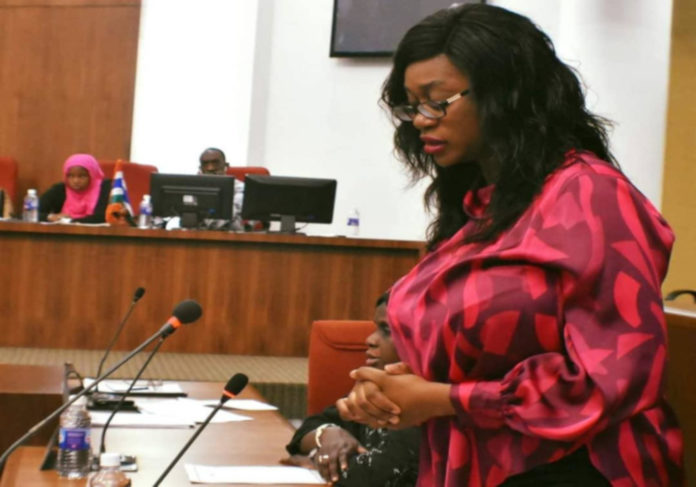By Yankuba Jallow
The Supreme Court of the Gambia is set to deliver judgment in the case involving Ya Kumba Jaiteh, an ex-member of the National Assembly whose nomination as a member of the National Assembly (NA) was revoked by the President.
Ya Kumba was nominated by the President and became a member of the National Assembly after she took the prescribe oath in April 2017.
Ya Kumba Jaiteh brought an action before the Supreme Court to declare the revocation of her nomination as a member of Parliament by President Adama Barrow, as unconstitutional. She wants the Supreme Court to declare whether President Barrow has the power to revoke her nomination under the Constitution.
“It is the Plaintiff’s (Ya Kumba’s) case therefore, that the purported removal of the Plaintiff by the President is altra virus. The President has no powers to seek to revoke the nomination of the Plaintiff once she was a substantive member of the National Assembly,” Counsel Yassin Senghore told the Supreme Court.
She argued that the constitutional provision under section 76 provides that the President can only exercise powers conferred to him by the Constitution and an Act of the NA.
“There is no provision of law that gives the President the power to revoke the nomination of a member of the National Assembly,” she submitted.
Counsel Yassin Senghore, in her submission on behalf of Ya Kumba said the case sought to raise a fundamental issue of separation of power as regards to the Executive and the Legislature.
She said: “She (Ya Kumba) is asking whether the 1997 Constitution as amended makes any distinctions between a nominated member and an elected member when it comes to their removal.”
In her submission, Counsel Senghore relied on the provisions of sections 87 to 91 of the Constitution. She said section 88 of the Constitution depicts the two ways a person could become a member of the National Assembly which are; election or nomination by the President of the Republic.
“It is our submission that the Constitution makes a clear distinction between a candidate nominated by the President and a substantive member of the National Assembly,” Counsel Senghore.
She said there is no distinction between an elected member and a nominated member. She argued that once a person becomes a nominated member of the National Assembly (NA), he or she can only be removed as set out under section 91 of the Constitution, which according to her explains the procedure of removal of a member of the National Assembly.
“The Constitution in setting out the procedure of removal of a member of the National Assembly makes no distinction between a member who is elected and a member who is nominated by the President,” she said.
Lawyer Senghore maintained that Section 91 does not vest any powers on the President to revoke the nomination of a member of the National Assembly once the prescribe oath is taken and the person nominated is a substantive member of the National Assembly. She cited 89(2) which according to her, provides that one does not become a member of the National Assembly without taking the prescribe oath. She put forward that once a nominated member becomes a substantive member of the National Assembly, he or she has the privileges and rights as that of the elected members.
Counsel Senghore further argued that Section 91 is a specific provision whereas section 231 is a general provision. “When a specific provision has been made, reliance cannot be made on a general provision to defeat or contradict the specific provision.” She said the section that set out how a member of the National Assembly can lose her seat is section 91.
She remarked: “It is our submission, that it is contrary to the principle of our democracy, to suggest as done by the Honourable Attorney-General, that the Plaintiff (Ya Kumba) is required to serve at the pleasure of the President.”
Counsel Senghore said the functions and roles of the National Assembly will not be served if members would serve at the pleasure of the President.
“To suggest that in exercising your function as a member of the National Assembly, you are exercising at the pleasure of the President falls foul to the principle of separation of power,” Counsel Senghore said.
“Does the nomination by the President vitiate the Principle of Separation of Powers?” asked Justice Sock.
Counsel Senghore responded in the negative adding that ‘when we are talking about the principle of separation of powers, it has to be look in line with the laws. In this jurisdiction, there is no difference between a nominated member and an elected member of the National Assembly but unlike other jurisdictions where there is a distinction. An elected member represents the whole country despite being elected by their constituency and likewise nominated members represent the whole country”
For his part, the Attorney-General said section 231 of the Constitution gives the President the power to revoke Ya Kumba’s nomination as a member of the National Assembly.
“Revocation can only come after the nomination of the member and not before nomination,” he said.
He said the Constitution should not be read in pieces but as a whole, adding that section 91 does not accord itself exclusivity for removing a member of the NA.
“Section 91 is not in conflict with 231,” he said.
He said the Plaintiff’s case lacks merit and urged the court to declare that the President does not contravene any provisions of the Constitution.
“The Plaintiff (Ya Kumba) has failed to demonstrate with specificity any provision that the President violates,” he said.
He said the Constitution provides for the recall of elected members whereas what Ya Kumba is seeking, if held, it will mean no one can recall a nominated member.
On her reply, Senghore said there is no right to recall for elected members of the National Assembly because there is no Act of the National Assembly that set out how an elected member could be recalled.
She said section 231 has to be subjected to the provisions of section 91.
















